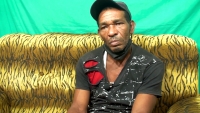Frediberto Duperet Reuz
* 1966
-
“But imagine that you are going to pick up a garbage to the places with people infected with the COVID-19 [in March 2020 the World Health Organization proclaimed a global pandemic situation due to the coronavirus] and for this, you do not have necessary disinfection or something. Imagine. Nobody told me about the situation, nobody warned me not to go there or to be more careful. And with all the faith I went there because I had to pick up the trash also from the hospitals, and later they told me that by this time they already had several cases with coronavirus. But I went there, without having any type of protection, because we had no protection, here in Cuba there is no protection for the dustmen. Even that we should have something to be protected. However due to a mistake, there was not and still there is not protection for us.”
-
“In the work camps in Panama, there they just grabbed the other Cubans, they caught them. They did a lot of staff, a lot of things that happened, that are not easy to know. But what we did know was, that whoever was being caught, was passed to another place, do you understand? They were passing the emigrants directly back to Cuba, that was the thing that you had to be aware all the time, I have always been conscious and awake, to avoid being transferred back to Cuba.”
-
“The United States Coast Guard was at the top of receiving Cuban emigrants, this was already known. So, we knew it too. What we had to achieve was to reach the waters of the maritime borders, of the Cuban and American territory, but that was not easy. However, we made it at the moment, when we at least expected it, but we achieved it. ‘Did you pass through hunger and thirst?’ We went through all this. Fortunately, thanks to the lemons, because we lost everything from the boat but the lemons - these French ones, it was the only thing I could eat and drink. You cannot drink sea water, but we were living from the drops of lemon, and that is what kept us alive. We arrived on foot, we had I do not know what, but we arrived that we still could stand on our foot and our raft served too. So, the raft was great, because not sinking it was not easy.”
-
“When I was going to the police office, they told me that they caught Ricardito with I do not know what, that he had a certain thing in his house that he had stolen. If Ricardito had been caught, they pretended like he was, well, neither of us even did not want to know what that could mean, because they were talking about violence that neither of us had done. But I did not want to be [penalized] for the robbery at his home, they said that I was waiting for him in front of the robbed house. They united our causes, of both of us, so they interrogated us like that. But the police already harassed us. Instead of convicting me for mine crime, you know, and Ricardito for another crime. They united both crimes in one violent robbery, something that neither of us would have done, but they imprisoned us in that invented cause. They gave me for that eight years in a jail and to him about six years.”
-
Full recordings
-
Cuba, 16.06.2020
(audio)
duration: 01:25:51
Full recordings are available only for logged users.
“I would like to share my testimony so that everyone knows what can happen in a communist regime.”
Frediberto Duperet Reuz spent in total 13 years imprisoned in different Cuban prisons, including the “Combined Prison of Guantanamo,” the “Chafarinas Correctional Facility,” and the “Combined Prison of Ariza” in Cienfuegos. He was convicted of various crimes - robbery and supposed violent acts. His first imprisonment occurred when he was barely 16 years old, and without mediating the fact that he was a minor, he was kept for months in a dark underground cell. In 1994 he decided to leave Cuba during the Cuban Rafters Crisis [Crisis de los Balseros] and emigrated on a raft to the United States. He was saved from the sea by the American Coast Guard and taken to the US naval base in Guantanamo Bay. With other Cuban emigrants, he was transferred to a labor camp in Panama. Two years later, in 1996, he was returned to Cuba because of violent confrontations with an immigration officer. In Cuba, he was sent directly to prison for two years. He left that penitentiary in 1998. Since then, he has worked in various positions as a bricklayer and assistant mechanic. In the last seven years as a communal sweeper without a fixed salary or necessary protection such as gloves or boots. He resides in Guantánamo. Frediberto wishes to share his story, to spread to the world his experiences with injustice in the communist regime in Cuba.
